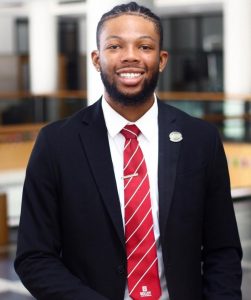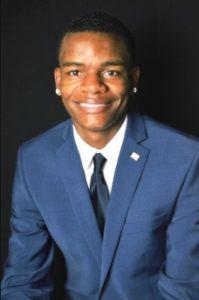

Sharod Holmes (left); Nick Telman (right)


Written by Shoemaker Scholar Brady Anderson
Year and Major:
Sharod is a recent graduate who graduated last year with majors in Marketing and Sales. Nick is a senior majoring in Marketing.
What is your startup’s story?
Artis started back in 2020 in May. We’ve been working on this project for black creatives to create an inclusive space for black creatives. We’ve been doing a lot to support black creatives. We’ve created a playlist for black creatives to allow artists to show their sound, made a catalogue for artists to show off their work and clothes.
Over the summer we spent a lot of time considering the best way to interact and interviewing artists to incorporate their ideas/pain points into the product while building out the Artis brand.
Coming into January, while applying into an accelerator program the nature of the idea changed into a discovery platform. We changed this from something that required a higher level of commitment making our platform more of a centralized highlight of the work black creatives are doing. Currently we are preparing for BeNimble.co which is a pitch competition for minority owned businesses. Finally, we plan on launching a beta on February 28th where you can sign up artis.community.
What is your typical beverage if you were to walk into a cafe?
Sharod: Tea, I think tea is really good for you but around thanksgiving I need the pumpkin spice latte.
Nick: Mocha, I’m a sweet tooth so having that extra chocolate in there is good for me.
What entrepreneurial or innovative business or project are you currently working on?
Artis is a discovery platform that reinvents how black creative is discovered, supported and connected by allowing users to create aggregated portfolios. This highlights their various locations they have posted their portfolios centralizing their art in one place.
What has been the most useful entrepreneurial resource or experience at the university?
Sharod: “The most useful resource has been the people at the university I’ve been able to connect with. There isn’t really a specific resource that campus has offered, and the Kelley Office of Diversity Initiatives (KODI) has a program called the Kelley Excel program that provides underclassmen with graduate mentors. Micah Pellerin served as my mentor as well as Precious Price who to this day still assists me fine tune the idea. Finally, Tyler Kelly works in the KODI office and is helping us with our pitch preparation.”
Nick: “The students have definitely been the best resource. The people we’ve met that served as advisors that listen to our thoughts and ideas have really guided us along our process. How we carry ourselves and articulate ourselves has been really important getting us here. The connections outside of Kelley additionally have been great help. IU is known for a lot of different things and that network has been extremely helpful.”
What was your favorite failure or learning experience?
Nick started by talking about the idea creation phase during the summer. “Discovering the multitude of different businesses that are already working on this problem set was a little off putting. This was my first time working in a startup environment so finding out the ideas wasn’t as original made me start to think about what makes us different. We need to be open to change.”
Sharod explained his biggest learning experience was during his meeting by getting into an accelerator program. “The advisor explained she liked what we had, but I was going about it the wrong way. This encouraged me to think about a different way to go about developing the idea. Initially our idea had a lot of competitors, but the current vision of Artis changed the competitors to potential partners. I love when someone tells me the idea is not good enough because it makes me consider the idea differently and leads to innovation.”
What is the best advice you’ve received as an entrepreneur?
Sharod: The best advice I’ve received is always to keep learning and keep doing. Instead of thinking about what you are going to do you need to learn and do.
Nick: To care about your idea but don’t become overly attached to them. Everything needs to be scrutinized so it is the best it can be. Being overly attached to something prevents you from being willing to change and improve it. It stops you from going somewhere with an idea that could improve it.
Is there anything else you would like us to know about you?
Sharod: The biggest thing that drives me is my belief in myself. I feel like I will always be able to figure things out when I need to. I enjoy learning a lot and I’m very resourceful in how I solve problems. I’ve never taken formal courses on designing and UX, but I was able to do this for the platform. I was able to find my team at IU. My resourcefulness and my belief in myself is my biggest strength.
Nick: I am a journalist and I’ve been writing within the technology industry and business field for 4-5 months with a focus on black technology and business. I’ve been able to see what it takes to succeed with the behind the scenes aspect with startups and getting them off the ground.
Are you open to connecting with other students if they are interested? Where can people find you?
Nick_telman on twitter
We are interested in connecting with any students the best place to reach us is through our Instagram ( Artis.community) and on our website artis.community where we will have our landing page.
How is your project addressing adversity you have faced in your life?
Nick: Working for IDS and being on a board for Kelley in a predominantly white club when we needed black minority students to contribute there was no list. It was always a scramble to find someone that we know or someone who knows somebody. This application compartmentalizes all of it for people to access to be able to contribute for their club.
Sharod: When I was a senior in Kelley, I realized I didn’t want to go through the regular recruitment process unless it was exactly what I wanted to do. I didn’t come to college to work for somebody unless it was in consulting in a design space. I realized working on entrepreneurial design was difficult to get in front of people. I wanted to work for designs for people who look like me. I wanted to create a way for people to be found for design work. Most people don’t have great search engine optimization.
What are some of the key influences in your design process?
Sharod: How I go about my process is similar to how music creators go about it. I’ll draw up a bunch of concepts then go in Figma to line everything up and perfect it. Apple is always innovating when it comes to design they always are practicing the best design practices. So when people come to artists the platform seems familiar. People can see designs they are familiar with and not realize why they like it and understand it. Additionally, I get a lot of ideas from music cover art.
Nick: While I’m not a designer, when I’ve had my ideas on what things should look like I go on what I’ve seen in my life. I’m greatly influenced by urban colors with a more gothic feel. A lot of my life experiences have guided how I make my decisions.